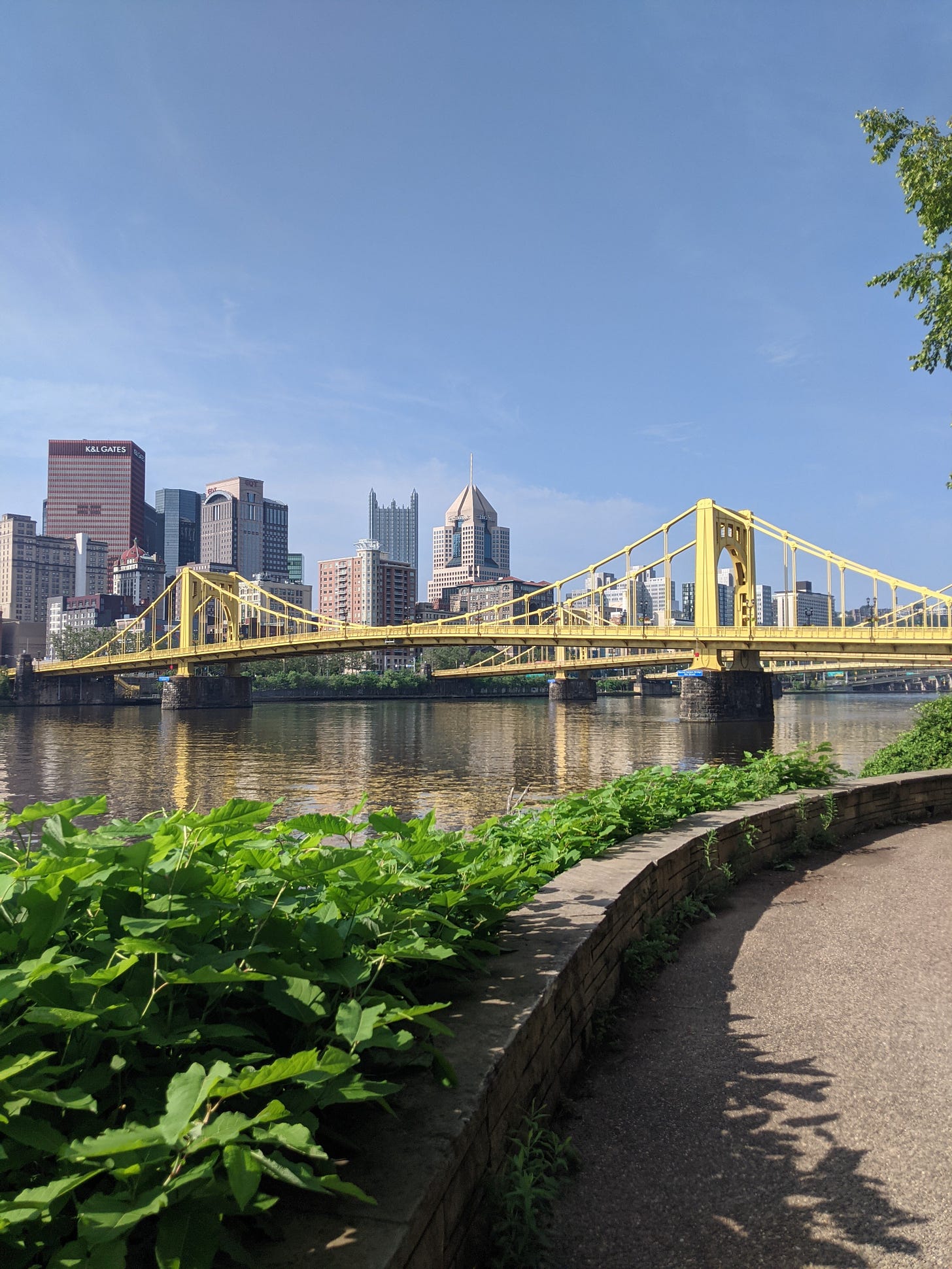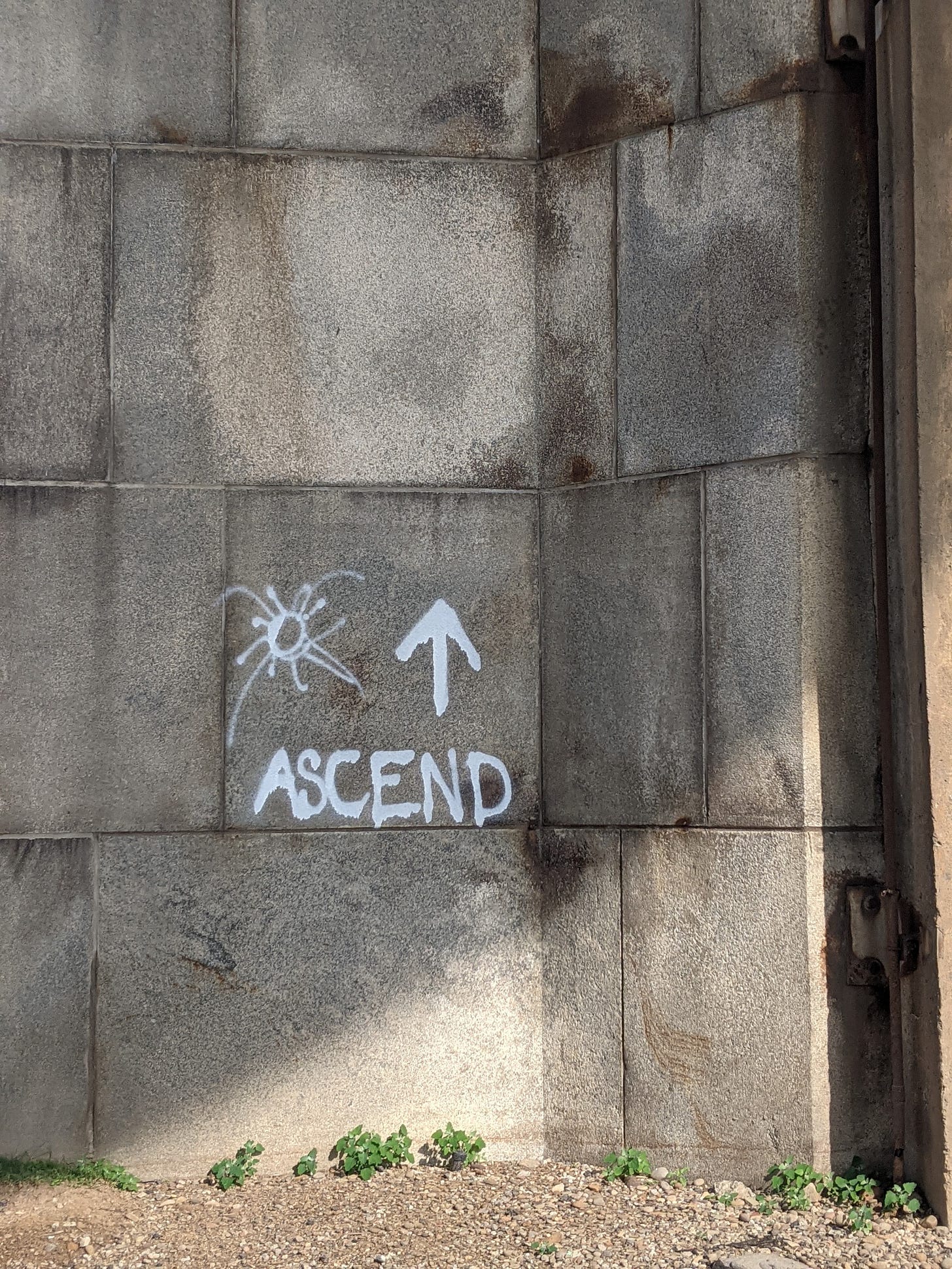Hello there. How is your writing going?
I’m in Pittsburgh this week and next, and just about every day after I drop my kids off at camp, I go for a run along the Three Rivers Heritage trail. In just a couple miles, it’s got basically everything I love: rivers, bridges, a huge Iron City Beer sign, stadiums.
I’ve been thinking about what running has taught me about writing. There’s a little voice I hear sometimes when I’m running or writing that says, maybe we should just quit early today, let’s walk a little while, don’t we deserve a break. And sometimes that really is the voice of compassion and self-care—but sometimes it’s something more like self-doubt or self-sabotage. Sometime that voice is really saying you probably can’t do the whole thing anyway, so why not just give up now?
Writing is so hard, and doing good work takes such a long time. Like running, it gets done day by day. It’s okay to walk a little ways, and it can be great to take a break. But you can also often go a little farther than you think.
back to writing: fall 2021
I’ve been thinking about burst writing, like doing a poem a day in April or the 14 days of Jami Attenberg’s #1000wordsofsummer. It’s usually a pace you couldn’t keep up in the long term, but it can be so energizing as a jump start. So I’ve been thinking about how to extend that momentum into a practice that works in the long run.
Starting September 1, I’m going to a run an 8 week series on developing a sustainable writing practice. We’ll start by developing a vision for your work, and I’ll give tips about creating accountability systems and making time to write when life is busy. The series will also include interviews with writers and writing researchers who can provide perspective on overcoming obstacles. I’ll also run a weekly thread where you can share your writing goals and check in for encouragement and accountability. You can do a lot in 8 weeks.
If you’re signed up for this newsletter, you’ll already get all the info for this series, which I’m calling Back to Writing, after my love for the back to school season and the fresh start energy it provides. This is the kind of project that really benefits from lots of participation, so if you have friends you think would enjoy it, I’d love for you to share the newsletter. I’d also love to hear about particular challenges you’re facing in your writing life, tips that have worked for you, or suggestions of people I should interview for the series.
I’m going to pretend I live in a highly civilized European country where everyone goes on month-long vacations in August and take a little break from the newsletter while I’m organizing this series and working on a couple other projects. I’ll check back in the last week of August with an outline of the series.
notes and reading suggestions:
I loved this essay by Jasmine Guillory about how “The Joy of Writing Got Me Through the Pandemic.”
And this book brought me so much joy—most of the joy I experienced in those long, difficult months, as a matter of fact. A lot of really hard things happened during that time, and when they did, I would retreat into the world of this book—a world where hard things also happen, but where I got to control them. This isn’t to say writing it was easy; I cried over it, many times, just as I cry over all of my books. But it also made me laugh, smile from ear to ear, and just be quietly happy: a feeling I had so little of last year.
Jami Attenberg is doing a Mini #1000wordsofsummer, running from August 8-13, if you could use a little push. (Sign up at the link above for a daily email with encouraging words.)
I’m working on a piece for Romper about the importance of casual social connections and how to deepen those friendships—and I’d love to hear from you! I’m especially interested in making “mom friends,” and how to go beyond the surface-level chit chat on the soccer sidelines. If you’ve made a new friend during the pandemic, how did you do it?
I just signed up for a webinar Molly Wizenberg is hosting on using Scrivener to organize a big writing project with research, drafts, and notes. I’ve used Scrivener for a bunch of years now but have always felt like I’m not really doing it “right” and have wished another writer would talk me through how they use it, so I’m excited to hear how Wizenberg used it to write The Fixed Stars. (I signed up even though I can’t watch it live and will view the recording, something I’ve truly never done!) It costs $100 but includes a great note that if cost is a barrier, you should just reach out to her.
I’d love to hear how your writing is going, or what you’re up to this summer, or if you have a favorite bridge or river. You can always reply to this email, comment below, or find me on twitter (@nancy_reddy) and instagram (@nancy.o.reddy).






